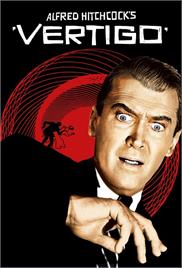Be Careful of Fake Websites. Always use HindiMovies.to domain & Join our Telegram Channel for Latest Updates.

Likes: 7
Views: 6.16K
Former Police detective John “Scottie” Ferguson was asked by a friend to investigate his wife named Madeleine since he was afraid that she might attempt to kill herself due to probable insanity as she thinks that she might be possessed by a dead woman. Scottie agrees and ended up falling in love with her. Unfortunately for him, Madeleine died and he was left alone until a woman named Judy came along and things start to unfold.
Duration: 128 min
Released: 1958
IMDb Rating: 8.4/10 (195,097 Votes)
Genre: Dubbed Movies, Mystery, Romance, Thriller
Stars: James Stewart, Kim Novak, Barbara Bel Geddes, Tom Helmore
Directors: Alfred Hitchcock
Writers: Alec Coppel, Samuel A. Taylor, Pierre Boileau, Thomas Narcejac
Year: 1958
Server 1 – Nowvideo
Server 2 – Bitvid
Vertigo (1958): A Cinematic Masterpiece by Alfred Hitchcock
"Vertigo," directed by the legendary Alfred Hitchcock, is an evocative blend of mystery, romance, and thriller genres, released in 1958. This film not only stands as a testament to Hitchcock's unparalleled directorial finesse but also continues to captivate audiences decades after its release. Known for its intricate storytelling, rich character development, and haunting atmosphere, "Vertigo" remains a seminal work in the annals of classic cinema.
Plot Synopsis
At the heart of "Vertigo" is the story of Scottie Ferguson, portrayed by the charismatic James Stewart, a former police detective who is rendered incapacitated due to a debilitating fear of heights — vertigo. When an old college acquaintance, Gavin Elster, hires Scottie to follow his enigmatic wife, Madeleine, Scottie embarks on a dark, mesmerizing journey. Madeleine, played by the enigmatic Kim Novak, appears to be possessed by a spirit from the past, and Scottie's obsession with unraveling the mystery plunges him deeper into a labyrinth of deceit, love, and psychological torment.
As the narrative unfolds, the film explores themes of identity, obsession, and the fragility of the human mind. Hitchcock masterfully weaves suspense and romance, creating a haunting experience that leaves viewers questioning the lines between reality and illusion.
Main Cast and Performances
Director and Writer
Alfred Hitchcock, often hailed as the "Master of Suspense," directed "Vertigo" with his signature style, combining meticulous visual composition with compelling psychological depth. The screenplay was penned by Alec Coppel and Samuel A. Taylor, based on the 1954 novel "D'entre les morts" (From Among the Dead) by Boileau-Narcejac, a French writing duo known for their thrilling narratives. The adaptation preserves the novel's suspenseful core while adding Hitchcock's distinctive cinematic flair.
Technical Excellence and Cinematic Innovation
"Vertigo" is renowned for its technical achievements, particularly in cinematography and special effects. Robert Burks' cinematography captures San Francisco with a dreamlike quality that enhances the film's ethereal mood. Notably, the film employs innovative camera techniques, including the famous "dolly zoom" or "Vertigo effect," which visually conveys Scottie's acrophobia by simultaneously zooming in while pulling the camera backward. This inventive shot has since become iconic in cinematic history.
The film's color palette, dominated by greens, reds, and blues, subtly influences the emotional undertones and reflects the psychological themes. Moreover, the haunting musical score by Bernard Herrmann amplifies the film's emotional intensity, weaving a sonic tapestry of suspense and melancholy.
Themes and Impact
"Vertigo" delves deeply into complex psychological themes such as obsession, manipulation, and the elusiveness of truth. It examines how perception shapes reality, and how the past continually haunts the present. The layered narrative compels viewers to question the reliability of memory and identity.
Though the film initially received mixed reviews and underperformed at the box office, it has since been re-evaluated and celebrated as one of Hitchcock's finest works. It often ranks high in critics’ lists of greatest films ever made, including being named the #1 film in the Sight & Sound critics' poll in 2012. Its influence permeates popular culture and continues to inspire filmmakers and audiences worldwide.
Conclusion
"Vertigo" is a masterclass in filmmaking that transcends its era through timeless storytelling, compelling performances, and groundbreaking cinematic techniques. It remains a deeply affecting exploration of human vulnerability, desire, and deception. For anyone interested in film history or psychology-driven narratives, "Vertigo" is an essential viewing experience that exemplifies the artistic brilliance of Alfred Hitchcock and the golden age of cinema.
For more information, you can visit the Vertigo IMDB page.